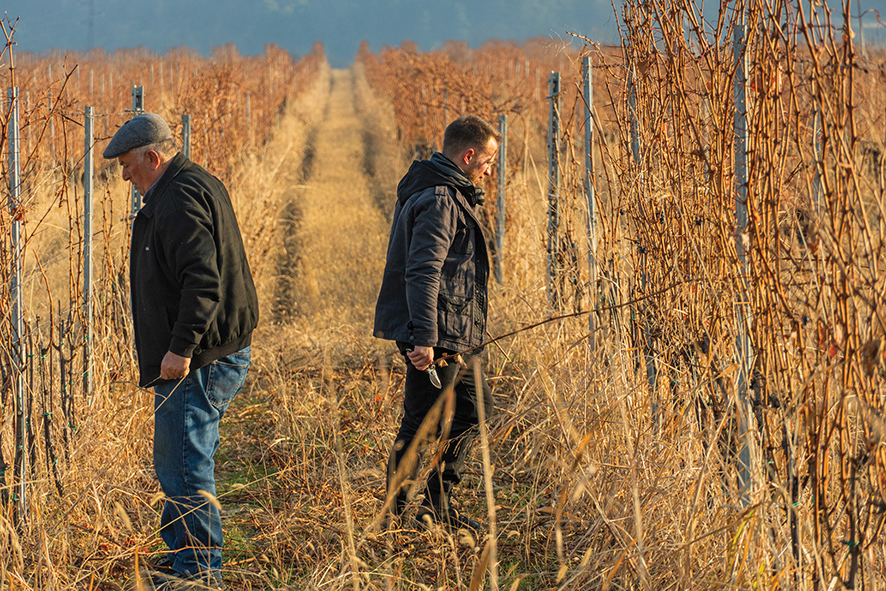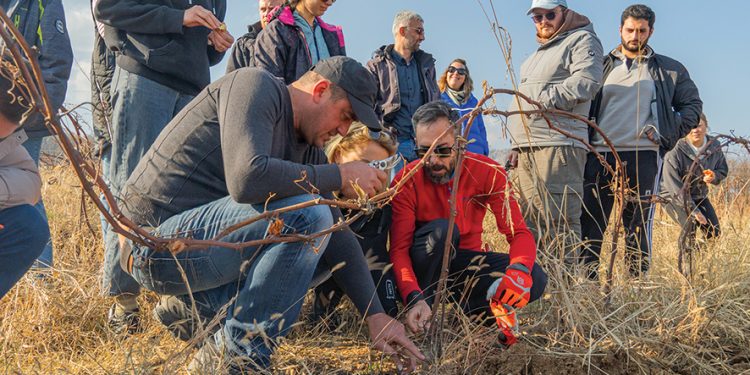In November 2024, the Food and Agriculture Organization of the United Nations (FAO), through the European Union (EU) and Sweden-funded IV phase of the European Neighborhood Program for Agriculture and Development (ENPARD), delivered a series of practical and theoretical winter pruning training modules. The educational program aimed to strengthen the safe grapevine production capacity and, consequently, the competitiveness of Georgia’s wine sector on national and international levels.

Led by FAO’s International Expert – Julio Prieto Diaz, the training series consisted of field-level practical pruning exercises, as well as theoretical presentations on the topic. While in Georgia, Mr. Prieto Diaz held educational meetings with a selected group of professional viticulturists, university students, and other wine producers and agronomists who expressed interest in advancing their knowledge in specialized grapevine winter pruning techniques.

The skills and knowledge transferred during the training are important to ensure grapevine health and improve grape quality, safety, and yield.
The activities implemented for the selected group of 15 viticulturists followed the Training of Trainers format to ensure a spillover effect of Prieto Diaz’s knowledge-sharing modules. Subsequently, the participants of these capacity-building sessions will train additional viticulturists on the notions acquired, particularly advanced winter pruning practices and formation across vineyards of varying ages. Notably, FAO plans to provide the 15 Training of Trainers participants with the opportunity to gain more in-depth knowledge on green pruning in Spring 2025.

FAO’s International Expert also conducted lectures for 75 students of the Georgian Technical University and Caucasus International University to equip the new generation of agronomists with the capacity to advance the country’s wine sector.

Finally, Prieto Diaz led the Pruning Festival, during which around 80 Georgian professionals interested in advanced winter pruning techniques had the opportunity to do so in the field. The practical sessions were held at the Crush 525 vineyards in Saguramo, in the Mtskheta Mtianeti region of Georgia.
“FAO, through the support of the EU and Sweden, has been meeting the continued interest and demand from wineries across the country on knowledge-sharing about modern grapevine pruning techniques and the related phytosanitary implications,” says Guido Agostinucci, FAO Program Manager. “These educational modules have been successfully providing the country’s viticulturists with the necessary knowledge and skills to ensure better quality and safer production, both being essential for the competitiveness of the Georgian wine sector. On this specific occasion, the training series included a Training of Trainers component to foster the spread of knowledge throughout the country, while also providing access to valuable vineyard pruning insights to Georgian students who will soon enter the job market. Considering the impact that these knowledge-sharing meetings have been having, FAO plans to further expand such opportunities for the Georgian wine producers and viticulturists under ENPARD IV.”

“Wine is an integral part of the Georgian identity, and it is the backbone of its agricultural sector, connected to country’s rich and diverse history. I am glad to see that viticulturists from all generations were actively engaged in these training series, since their expertise lays the foundation for a more competitive wine sector with more export opportunities, opening doors for introducing the uniqueness of Georgian culture and traditions to EU consumers,” says Denis Reiss, Program Officer for Sustainable Food Systems at the Delegation of the European Union to Georgia.

About the European Union
For more than 30 years, the European Union has built a close partnership with Georgia, supporting its development through knowledge and experience sharing, expertise, innovation and financial support. The relationship between the EU and Georgia is based on shared values of peace, freedom, democracy, human rights and inclusive economic growth. More about the EU’s support in Georgia https://eu4georgia.eu/the-european-union-in-georgia/
About ENPARD
The European Union supports rural development in Georgia through its ENPARD Program. Aiming to reduce rural poverty, ENPARD has been implemented since 2013. The Program started by supporting the development of national agriculture potential. Subsequently, it also concentrated on creating economic opportunities for rural populations in Georgia. Since 2021, the Program has also been working on improving food safety in the country, with additional support from Sweden and with FAO and the Czech Development Agency as the main implementers of this food safety component under ENPARD IV.














